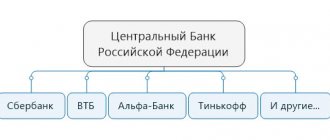Decor
Objections to the appeal are drawn up according to the general rules for drawing up reviews of procedural documents.
Objections begin with the so-called “header”, which includes:
- name of the addressee, that is, the name of the appellate and cassation authority;
- name (full name) of the author of the objections, his place of residence and procedural status (plaintiff, defendant, representative of one of the parties, third party).
Immediately under the heading, with the words “Objections to the appeal in case No. ________,” the descriptive part of the document begins. The descriptive part must necessarily include:
- the essence of the claim and the names of the parties to the claim;
- information about the date of the decision of the court of first instance and its contents;
- information about the content of the appeal (cassation complaint);
- refutation of the arguments of the complaint with references to the sheets of the case, which the arguments of the complaint contradict.
The descriptive part ends with the words “based on the above, P O SHU”, after which the operative part begins, containing a direct request to the appellate authority to accept the arguments of the objections and reject the arguments of the complaint.
The text of the document ends with the date of drawing up the objections and the signature of their author.
There is no need to attach any documents to the objections to the complaint, since, as mentioned above, the appellate instance only considers evidence that was studied during the consideration of the case, that is, already available in the case file.
How to make an objection correctly
The response to the appeal must be submitted in writing. There are no requirements regarding the form of the document, so you can stick to the usual form. All you need is to follow the basic rules of office work.
The Code of Civil Procedure of the Russian Federation (Article 131) will help you understand how to draw up an objection to an appeal.
In accordance with it, the text of the document reflects the following information:
- The name of the judicial authority to which the appeal is sent, with its address;
- Information about the applicant who filed the complaint (his full name, registration, residence address and procedural status are indicated);
- An indication of the appeal to which the objection is being drawn up;
- List of documents and applications, if necessary;
- The author of the objection signs it.
Attention! See an example of objections to an appeal:
A clear, consistent and well-founded presentation is required.
It is this approach that can positively influence decision making: there are more chances for a positive outcome.
But it would still be better to use a sample objection to an appeal.
This way you can avoid mistakes at the initial stage of document preparation.
Additionally, it is written for what purpose the objection is being drawn up, what exactly the applicant is trying to achieve when filing it.
To which court are objections to the complaint filed?
Objections to a complaint, unlike the complaint itself, can be filed both with the court that made the decision and with the appellate (cassation) instance. This is due to the fact that objections are a procedural document derived from a complaint. That is, in order to write objections, the party needs to know about the fact of its existence and at least read it.
A copy of the complaint is sent to the opposing party, usually by mail. In this case, the mail may not reach or not reach the opposing party for any other reason, which means that the participant in the process may not have time to write objections before the case is sent for consideration to the appellate instance.
Since writing objections to a complaint is not a procedural obligation of the participants, the absence of objections will not prevent the start of appeal proceedings.
When a claim is filed in court, the case is considered and a decision is made. However, in order to support the adversarial nature of the judicial process, the legislation makes it possible to continue the consideration of the case by filing an appeal.
Expert opinion
Stepanov Maxim Anatolievich
Legal consultant with 6 years of experience. Specialization: civil law. Extensive experience in drafting contracts.
Thus, the previously defeated party can initiate continuation of the proceedings in court. The other party has the choice of doing nothing in response or filing an objection to the civil appeal.
general information
Any citizen can file a complaint against a court decision if his rights and interests are affected. This right is guaranteed by the Code of Civil Procedure of the Russian Federation. A complaint is filed when an interested person fully or partially disagrees with a court decision.
But for a complaint to be considered, valid reasons are needed. It is filed if the court hearing the case makes serious mistakes. All the opponent’s arguments and procedural nuances can be challenged - this is the meaning of the objection.
The form of the document is usually written, but the option of an oral objection is not excluded if it is submitted during the judicial consideration of the case.
Important! The purpose of an objection is to question the validity of the opponent’s arguments, statements and evidence presented. When preparing a document, only facts should be used.
An objection allows litigants to build an additional line of defense in the case. It is here that the principle of adversarial nature of the parties to a trial is implemented. The entire civil process is based on it.
From the above it follows that an objection to a complaint is an effective additional defense tool that allows you to substantiate and consistently prove the fragility of your opponent’s arguments.
Watch the video. Objections to the appeal:
When and where to go
The plaintiff who wins it at the first stage has the right not to take any steps at this moment, just wait for the start of the court hearing. He also has the opportunity to write an objection to the appeal.
When the court accepts this document, it notifies all parties to the proceeding. After this, you need to carefully study it, competently draw up an objection and collect the necessary package of documents.
He is brought to the court where the hearing of the case took place. This must be done within a month. The court has the right to extend the period.
When filing, it is necessary to prepare the document in the required number of copies so that it is received by the court and the parties participating in the trial.
Documents for participants can be sent by mail. In this case, you need to use registered letters with acknowledgment of receipt and a description of the attachments. In this way, it will be possible to later confirm that the requirements for sending papers have been met if you save the postal receipts.
How to write
To make your position more convincing, it is recommended to outline your approach, present your own arguments, supported by evidence.
The subject of objection may be the appeal as a whole, or only certain parts.
Where to begin
In order to draw up the most effective document, you need to remember that the complaint is written in response to an appeal.
When compiling it, you need to consider the following.
| What to do | Why is it important |
| Study the appeal | The main point of the objection is to deprive it of persuasiveness in the eyes of the court |
| Refute arguments | It is necessary to show the inconsistency of attempts to revise the original decision |
| State your approach | Convince the court of the correctness of your view of the situation |
| Validity | The importance of using legal references and documentary evidence |
The analysis of the arguments presented by the opponent must be evidential and confirm the correctness of the author of the objection.
When drawing up an appeal to satisfy it, it is not allowed to use arguments or mention facts that were not raised during the initial consideration by the court of first instance. If the opponent resorts to such methods of persuasion, this must be indicated when drawing up an objection.
In such a situation, the author of the appeal abuses the right to present evidence, violating the Code of Civil Procedure of the Russian Federation.
How to work with arguments
When conducting a judicial review, the legislation ensures that the parties are adversarial. The losing party in the case seeks to challenge the decision. The appeal presents a view of things that is sometimes confusing, obscuring the essence of the situation at hand.
Filing a complaint clarifies this document for the judge and creates a more correct coverage of the case from the point of view of the other side.
When analyzing an opponent's arguments, it is necessary to examine each argument presented by him for procedural distortion of facts. When found, it is necessary to note them and provide arguments as to why exactly this took place.
Since these circumstances were considered by the court of first instance, the participants in the trial may question the competence of the judge who presided over this case.
If during the trial the question of replacing the judge was not raised, then we are talking about an attempt to reinterpret, misinterpret his conclusions, which can be considered as an abuse of the opponent’s right to appeal.
What to pay attention to
- It is important to convey to the court your view of the situation, supporting it with legal references to articles of regulations, confirming your position with facts and documents.
- We must take time to analyze the arguments presented. If the opponent claims that the evidence was previously misjudged, then the question must be raised as to whether the other party previously made comments on this topic during the consideration of the case.
- Minutes are taken during meetings. It reflects what was said during the trial. If there were no objections to the arguments, then both sides agreed with their correctness and validity.
By presenting the objection in this way, there is reason to conclude that the process was conducted flawlessly and there is no basis for filing an appeal.
Sample 2021
Expert opinion
Stepanov Maxim Anatolievich
Legal consultant with 6 years of experience. Specialization: civil law. Extensive experience in drafting contracts.
There is no special form provided for filing a complaint. The document must be prepared in writing. There is no need for certification by a notary.
In practice, a document format has developed that is recommended to be followed when describing it:
- The top line must contain the exact name of the court to which the complaint is being filed. You must indicate the address of its location.
- The author of the complaint indicates personal information, his name and position in this lawsuit.
- The main part of the text lists the details of the appeal statement against which the complaint is being written.
- It is necessary to specifically indicate in the text what exactly the author of this document is asking for.
- Next, his point of view is stated and convincing arguments are given to confirm that he is right.
- A list of attached documents is provided.
- At the end of the text, the author's signature must be placed , a transcript must be provided, and the date the complaint was written must be indicated.
Example of using a document
If a situation arises where an interested party files a complaint to a court of second instance, seeking to overturn a decision made by the court, the defendant needs to protect his interests.
After receiving a copy of the document, a document is drawn up, the purpose of which is to leave the previously made decision of the trial court in force.
This situation needs to be illustrated with an example of the effective use of an objection to an appeal.
In this case, the subject of the judicial review was that the defendant, when examining the case in the court of first instance, did not pay for the received consignment of goods. The court recognized the payment arrears and ordered the defendant to pay:
- missing amount;
- interest for its use;
- state fee for going to court;
- payment for representative services.
The defendant based his appeal on the fact that the procedure for considering the case was violated - he was not notified of the trial.
The objection to this complaint was based on the following arguments.
- The Unified Register indicates the legal address of the company to which the notification was sent.
- An attempt was made to hand over the relevant documents personally to the director, which he evaded. An act was drawn up reflecting this fact.
- The post office sent notifications three times that documents were needed, but a company representative did not show up to collect them.
According to Article 123 of the Arbitration Procedural Code, it is considered that under the specified conditions (the documents were sent to the official legal address no later than 15 days before the start of the consideration, a notice was sent, but the recipient did not come for the documents), the defendant is considered to have been properly notified by the court.
The objection states that the defendant did not put forward any documents on the merits of the case, did not challenge the decision as a whole or part of it, and did not point out its groundlessness.
Here the arguments of the filed complaint were considered and its groundlessness was proven. This led the judge to uphold the earlier decision of the trial court.
Submission deadline
There is usually a one-month period for appealing after the court makes a decision.
He has the right, at his discretion, to set the deadline for filing an objection if he deems it necessary.
Order
When filing an appeal, the court notifies the participants in the trial about this. Until this moment, it makes no sense to draw up the document because the appeal may be rejected or not accepted for consideration.
It is drawn up in free form, but it must contain all the necessary information provided for by the Civil Procedure Code. To apply, you must prepare a package of documents. It includes the objection, as well as the documents attached to it.
All this is submitted to the court that previously considered the case. A copy is sent to the other party to the process. When submitting documents, they are registered in the court office.
How to correctly formulate objections to an appeal? In what cases should you write objections? How to sue them?
We will tell you everything about objections to an appeal in a civil case. Download the sample. Ask questions to lawyers.
| Note! |
| Feedback on the appeal |
The court's decision in the case is made in favor of one of the parties to the dispute. Persons participating in the case who are not satisfied with the court's decision can appeal it on appeal. When receiving an appeal from the court, you can react with silence, you can file your own appeal, or you can write objections to the complaint.
Objections are filed if the court decision completely suits the applicant, and the other party in the appeal brings arguments that completely contradict the circumstances established during the proceedings.
Do I need to write?
In a civil case, it is not necessary to write an objection to an appeal from a party whose demands have been satisfied by the court. The law grants participants in a trial the right to write a refutation. If a party to the dispute believes that it will refute the arguments of the appeal in court directly, orally, a document is not drawn up.
Expert opinion
Golubev Denis Petrovich
Lawyer with 7 years of experience. Specialization: civil law. Author of dozens of articles in the media
Lawyers who specialize in civil cases recommend writing a rebuttal. In the content of this refutation, state your arguments and refer to the regulations that regulate legal relations. Refute the facts of other participants with arguments. Written refutations will be examined by the court of appeal and the arguments of the disputant will be taken into account.
They object to both the appeal as a whole and individual parts. The arguments are substantiated by evidence found in the case materials.
This is important to know: Loan agreement: essential terms, form, sample 2021
What do we take into account when writing a rebuttal?
A rebuttal to the appeal is filed after the party challenges the decision of the local court. Before drawing up an objection, lawyers carefully study what arguments the appellant uses to justify his claims. These arguments should be rebutted. Circumstances, facts, which deny the arguments of the appeal, and individual facts are brought up.
Having finished presenting the refutations, we explain the opposite position, why the court’s decision was legal and justified. They refer to the case materials, witness statements, written evidence.
A well-written statement will help the appellate court understand the dispute. Convincingly proves the legality of the decision. It will make it easier for the party who provides a rebuttal to the complaint to make a positive decision.
In the content of the appeal, the objections indicate only the circumstances and facts that were the subject of consideration by the local district court.
Important! References to circumstances that were not considered by the court are not taken into account. The court may consider such a position as an abuse of rights.
We refute the arguments
A participant in the case, if the dispute is lost, challenges the decision on appeal. The statement may refer to the fact that the decision was made by the judge in violation of the law. Some evidence and arguments were not taken into account. The process of considering a civil case has been disrupted.
The practice of appeal consideration shows that appeals are prepared illiterately. The appellant does not substantiate his arguments and points to facts that were not assessed by the court. Refers to circumstances that are not accepted for consideration by the local court. Arguing his position, he gives arguments without logical justification.
An objection to the complaint will help the court understand the case materials and assess the legality of the judge’s decision. Accept or reject the appellant's arguments.
Drawing up and filing objections to the appeal
Objections are drawn up after the court has accepted the appeal against the court decision. In this case, the appeal is sent to the participants in the civil case. They are invited to submit their objections within the deadline set by the court.
Objections to the appeal should be addressed to the appellate authority, the name of which is indicated in the header. There you must also indicate the details of the person submitting your objections (full name and address).
Be sure to indicate the name of the document: Objections to the appeal.
Expert opinion
Stepanov Maxim Anatolievich
Legal consultant with 6 years of experience. Specialization: civil law. Extensive experience in drafting contracts.
In the text of the objections, describe your position, indicate the reasons why you do not agree with the appeal. Sign the objections and date them.
Objections are submitted to the court that considered the case at first instance; documents confirming the existing objections can be attached to the objections. Objections are submitted with copies according to the number of participants in the case. The state fee when filing objections is not paid.
Feed term
The legislation does not provide a specific period for providing a rebuttal to a complaint. The local judicial authority, after receiving the appeal, in accordance with accepted practice, sets this period. The deadline for submitting justification depends on several important factors:
- Remoteness of residence of the parties to the dispute;
- Delivery time of documents by postal services;
- The legal complexity of a civil case and the need to familiarize yourself with the appeal, the arguments raised in the document;
- The number of parties to the dispute.
Expert opinion
Golubev Denis Petrovich
Lawyer with 7 years of experience. Specialization: civil law. Author of dozens of articles in the media
The term for presenting justification is indicated by the court in the covering letter that the court sends to the participants in the civil claim, as well as a copy of the appeal. In setting this period, the court is guided by the principle of reasonableness. Each participant in the case should have enough time to prepare an objection.
According to judicial practice, the term is one month. However, taking into account the above factors, the court extends the period.
Legal regulation of the issue is carried out by the norms of the Civil Procedure Code. We find answers to questions about the deadline for filing an objection in the clarifications of the Plenum of the Supreme Court of the Russian Federation, which regulate the proceedings in the appellate court.
Omitting a term with valid reasons is not a basis for refusing to accept an objection. The court, having accepted the arguments regarding the missed deadline, will accept the justification beyond the established deadline. This circumstance will entail delaying the consideration of the appeal hearing, since each party needs time to familiarize itself with the arguments of the objection.
Note! The legislation does not prohibit the parties to a dispute from providing a refutation directly to the appellate body. The Court of Appeal will take into account the reasons given.
What is the procedure
The party participating in the consideration of the claim is sent a copy of the appeal by the local court. This indicates that the appeal was approved and the decision of the district court will be considered on appeal.
This is important to know: Sample power of attorney in the MFC from an individual sample
If we do not receive copies of the complaint, there is no reason to file an objection. In practice, the courts, if an appeal is filed contrary to the established procedure, refuse to accept appeals.
Statements submitted to the court must comply in form with the requirements of the procedural normative act. If the participants in the case do not adhere to the terms of the law, write appeals, refutations according to their personal vision, the court will reasonably reject the appeal and will not accept other written evidence.
An appeal, an objection to an appeal, including in a civil case, together with documents confirming the arguments of the parties, are sent to the court. We send it to the body that made the decision - the local court. All documents of the parties will be registered in accordance with the established procedure by the office.
Deadline for filing objections to the appeal
The deadline for filing objections to an appeal in a civil case is determined by Article 325 of the Code of Civil Procedure of the Russian Federation and paragraph 15 of the Resolution of the Plenum of the Supreme Court of the Russian Federation “On the application by courts of the norms of civil procedural legislation governing proceedings in the court of appeal.”
According to this norm and clarifications of the highest court, the deadline for filing objections is set by the court of 1st instance. Persons participating in the case are informed about the deadlines in a notice, which is sent as a covering letter to the appeal.
The period for filing objections must be reasonable, which means taking into account the time required to send and deliver postal correspondence, the territorial distance from the court of residence or location of the persons participating in the case, the volume of the appeal, presentation, complexity of the case and other significant circumstances.
Typically, the deadline for filing objections is within the one-month period established for appeal, but it can be extended taking into account the factual circumstances.
| It is important! |
| The deadline for filing objections to an appeal in a civil case is established by the court |
It should be noted that the deadline for filing objections to an appeal is not preemptive. This means that objections filed outside the deadlines established by the court will still be accepted by the court.
However, since the court is obliged to familiarize other participants in the civil case with the received objections, late filing of objections may lead to a delay in the consideration of the case or to the postponement of the court hearing.
In fact, objections to the appeal can also be submitted to the court hearing of the appellate instance.
Missing the facts
We do not ask the court to pay attention to aspects that were not considered by the local court. We substantiate our position based solely on the evaluated arguments. Extra references will be incorrect and will be considered by the appeal as delaying the consideration of the dispute.
Please note that the appellate court does not consider statements or arguments that were not the subject of consideration by the court. Taking this circumstance into account, we present our legal position.
This is important to know: Sample application for a refund for a product
Sample objections to an appeal
In ____________________ (name of court)
From: ___________________ (full name, address)
Objections to the appeal
“___”_________ ____, a decision was made on ____________ (name of the court) in a civil case on the claim of _________ (full name of the plaintiff) against _________ (full name of the defendant) about _________ (indicate the essence of the claims). Court decision ____________ (indicate whether the claims were satisfied or the claim was denied).
“___”_________ ____ dated _________ (full name of the person who filed the appeal against the decision) an appeal against the decision was received, which stated _________ (indicate what requirements were stated in the appeal against the decision of the court of first instance).
I object to the arguments of the appeal _________ (indicate why the arguments of the complaint are not substantiated, what circumstances were stated incorrectly by the person who filed the complaint, what laws are interpreted incorrectly).
The court's conclusions are based on an objective and direct examination of all the evidence available in the case. All circumstances of legal significance during the consideration of the case were correctly established by the court.
The decision gave a proper assessment of the evidence presented; the court did not violate the requirements of Articles 59, 60, 67 of the Civil Procedure Code when resolving the case. The arguments cited in support of the appeal were the subject of verification in the court of first instance, and the court did not reasonably agree with them, as indicated in the court decision.
I believe that there are no grounds for satisfying the appeal or canceling the court decision.
Based on the above, guided by Articles 325, 330 of the Civil Procedure Code of the Russian Federation,
Ask:
- Leave the court decision dated “___”_________ ____ in the case unchanged, and the appeal is not satisfied.
List of documents attached to the objections (copies according to the number of persons participating in the case):
- Copy of objections
- Additional evidence supporting existing objections
Date of filing objections “___”_________ ____ Signature of the applicant _______
objections:
Objections to the appeal
Did not find an answer to your question? Ask it to a lawyer by phone!
The trial does not end with a decision by the trial court. The parties to the dispute may disagree with the final determination and continue the proceedings.
Expert opinion
Stepanov Maxim Anatolievich
Legal consultant with 6 years of experience. Specialization: civil law. Extensive experience in drafting contracts.
If the defendant has filed an appeal, the plaintiff or other participant has the right to express disagreement. The will of the second party is reflected in the form of an objection or response to the appeal, depending on the type of legal proceedings.
Appeal and cassation proceedings
A complaint by any party against a decision of the court of first instance contains not only a listing of the justifications for the party’s position given at the court hearing, but also criticism of the court’s assessment of evidence, which, in the opinion of one or another participant in the process, led to an incorrect decision, from his point of view.
The importance of competently drafting an appeal or cassation complaint and objections to it is due to the fact that the second instance does not consider the case on its merits, but only evaluates the evidence that was considered in the court of first instance.
At the same time, in the appeal process, oral presentations by the parties are of a formal nature and are reduced only to a statement of the content of the complaint. That is, it is the complaint and objections to it that become the subject of study by the panel of the appellate court.
Difference between review and objection
The concepts of “revocation” and “objection” in legal proceedings cannot be used as synonymous expressions within the framework of different Procedural Codes of the Russian Federation. The key differences between the definitions are as follows:
- the review contains the objections of the participants to the claim of the arbitration case;
- objection – civil case.
From the point of view of official documents filed by parties to a dispute in a lawsuit, these terms cannot be used interchangeably.
Each term refers to a separate area of law and is enshrined in distinct legal documents. The provisions regarding revocation are enshrined in Article 131 of the Code of Civil Procedure of the Russian Federation, objections to the appeal are in Article 149 of the Code of Civil Procedure of the Russian Federation.
However, as terms, these concepts can be used in related meaning within a particular context.
The review represents the participants' objections to the demands of the second party's appeal. The document in arbitration law must be submitted by the defendant without fail.
The relationship between the two concepts is established as “object-subject”; therefore, it is incorrect to call the arbitration review an objection as an official document.
In turn, an objection is formed in civil law in the format of a review, but in office work it is not a mandatory document.
The defendant has the right to express his disagreement with the appeal in writing at his own request, without court requirements.
The concept of “response to an appeal” can be used instead of “objection” in a civil case. It is incorrect to use the reverse definition.
Procedure for filing objections to an appeal
According to Article 389.7 of the Code of Criminal Procedure of the Russian Federation, in case of disagreement with the provisions set out in the appeal of the plaintiff or defendant, the person has the right to request a review of the decision.
The procedure for appeal in civil disputes is regulated by paragraph 2 of Article 325 of the Code of Civil Procedure of the Russian Federation.
An objection to an appeal in a civil or criminal case is referred to the court of first instance. Compared to an appeal, it is the responsibility of the applicant to inform third parties about the filing of the application.
The original document must be sent to the court, copies - to all participants in the trial. Confirmation of submission is attached to the application in the application.
Disagreement must be made in writing within the specified time frame. The documents are subsequently registered in the office and added to the case file.
It is recommended that you do not avoid opposing the submitted appeal. The step may make it possible to justify that the previously presented evidence was incorrectly assessed and a revision of the decision is necessary taking into account new arguments.
Differences between filing a complaint in a civil, criminal, or arbitration court
Depending on the category of the case, objections, together with the filed appeal, can be considered in a civil, criminal or arbitration court. There are no significant differences in filing such an objection to these authorities, but there are some features that are worth paying attention to:
- the criminal cases
themselves and the appeals and objections filed against them is carried out by magistrates or federal judges. The category of the judge will be determined depending on the severity of the crime committed by the defendant. In any case, the objection to the appeal is sent to the magistrate, and he, in turn, can send the materials to the appropriate district court. - The procedure for considering civil cases
in courts and appeals and objections filed against them is determined similarly to the rules for appealing criminal cases. The appeal itself, which will be filed by the defendant, has a limited period for filing - one month from the date of the decision. In this regard, after the expiration of such a period, filing an objection will no longer be necessary. - The system for filing appeals and objections to the arbitration court
provides, unlike other cases, the possibility of filing a complaint using a specially created service on the Internet - “My Arbitrator”. The date of receipt of the application is considered to be the day the text of the appeal or objection is downloaded.
Filing an objection to a civil or criminal appeal is not a mandatory procedure. If the plaintiff in the case intends to draw up such a document, he must meet the deadlines provided by law - 2 months.








